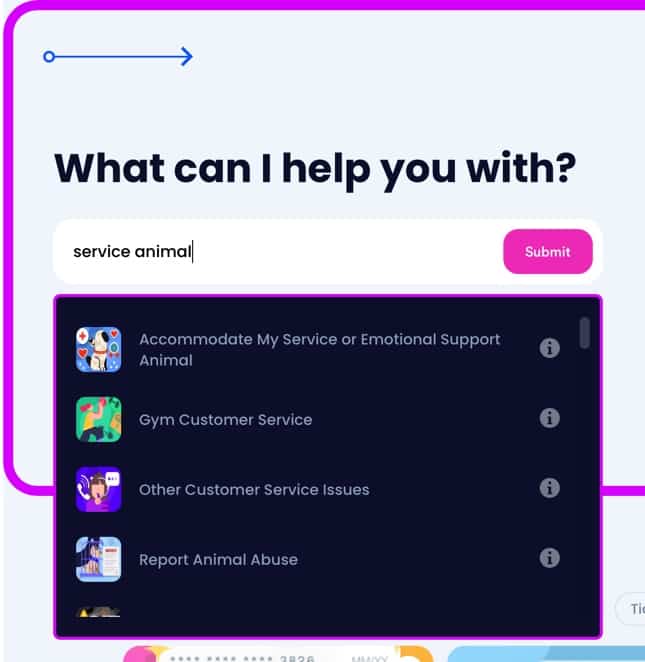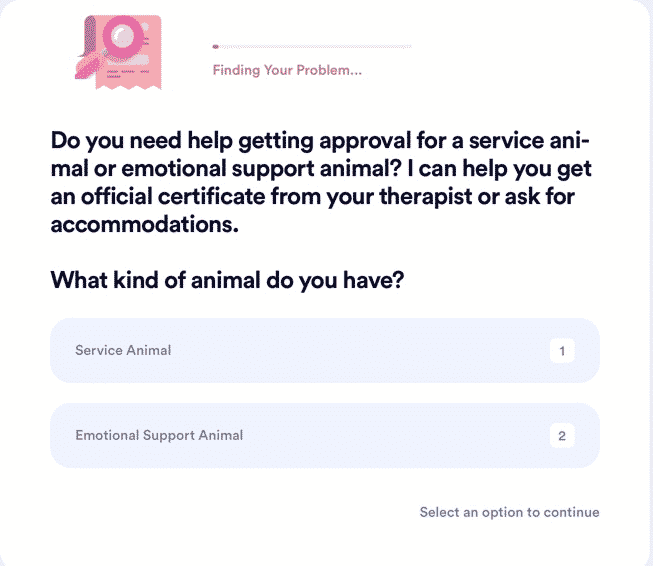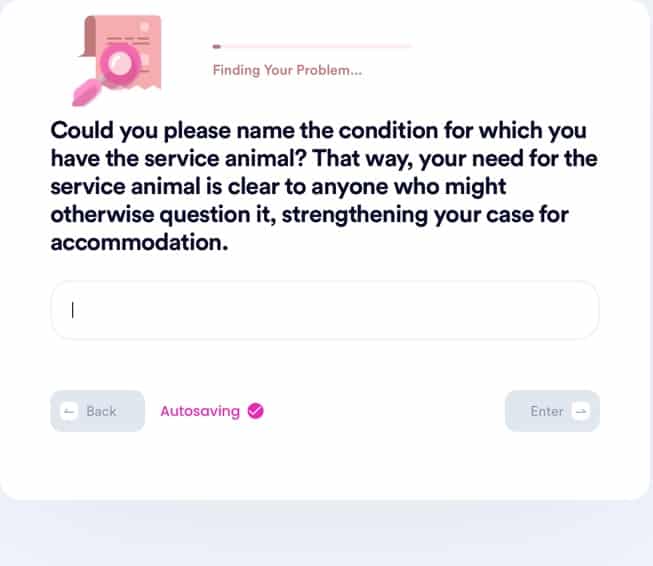Can You Keep an Emotional Support Animal in Your College Dorm Room?
Many students benefit from being around animals. For students with certain disabilities, an emotional support animal (ESA) can help them get over the transition to living away from home and deal with the stresses of campus life. This means that you might want to find out more about .
However, emotional support animals are not protected by the same laws as service dogs, and you might be asking whether you or your child can take their ESA dog or cat with them when they go to school.
DoNotPay can help you get your or your child permission to have their ESA with them on campus. We can also help with ESA letters for airlines including American Airlines, United, and Southwest.
What is an Emotional Support Animal?
An emotional support animal is a companion animal who provides benefits to somebody with a disability or mental health condition. Most ESAs are dogs or cats, but pocket pets and miniature horses are also sometimes used.
An ESA is not a service dog. The primary difference is that service dogs are trained to perform specific tasks to support the disabled person. These tasks might range from detecting blood sugar differences and encouraging a diabetic to eat something to picking up dropped items for somebody who can't bend over. Psychiatric service dogs are often confused with ESAs but, again, they are trained to do specific tasks such as blocking (preventing people from getting in the handler's personal space) or reminding people to take their meds.
Unlike service dogs, ESAs require no specialist training, but they should be well-mannered and know how to act around others.
Are College Dorms Required to Accept ESAs?
The short answer is yes. The Fair Housing Act gives all tenants, including students, the right to be accompanied by an emotional support animal if they have a qualified disability.
The long answer can be a little bit more complicated. Most universities have a specific policy regarding emotional support animals. Typically they:
- Are not allowed to accompany students to class.
- Are restricted to the student's own room (i.e., they are not allowed in another student's room, even with their permission, or in public areas such as study lounges).
- Are not allowed in dining facilities.
- Must be exercised in designated outdoor spaces. Dogs must be on leash at all times.
- Require written permission.
- May have species restrictions. Typically dogs and cats are okay, but some dorms may not allow rodents.
The process for getting your ESA approved to live with you at college can be very complicated. Often it has to be done well in advance of the start of the semester, especially as they need to make sure your assigned roommate is not allergic to, or afraid of, the animal (although some students with disabilities are granted single rooms). If the animal misbehaves or causes damage, they may be thrown out. Many people recommend that ESA dogs are trained to the Canine Good Citizen level to ensure that they know how to behave.
Colleges will also request proof that the animal is an ESA. Typically, this consists of a letter signed by a licensed mental health professional.
What Is an ESA Letter?
An ESA letter is essentially a doctor's note. It's a formal letter from your mental health professional that tells them why you need the ESA. Some colleges may have specific formatting requirements, while others avoid them because fake letters are often obvious templates. The letter must include:
- The date the letter is issued. It needs to be recent.
- The license number and expiration date of your therapist or professional.
- Your professional's contact information so they can check with them if necessary.
- A statement as to why the ESA is required.
| Any of the following licensed healthcare specialists can write up an ESA letter: |
|
| Some of the common mental conditions that qualify individuals to receive an ESA letter: |
|
There are a lot of scams out there for fake ESA letters or "ESA certificates" (there is no such thing as a certification process for ESAs or, for that matter, for service dogs). DoNotPay can help you with the request letter for the accommodation, getting you the information you need to pass to your therapist or psychiatrist.
In some cases, the college or state law may restrict who can write an ESA letter and you may need to get a specific referral.
How to Request Permission for an ESA in College Dorms
The process varies by college, but typically you need to:
- Go to their website well before move in date and check the requirements.
- Make sure your ESA is up to date on all required vaccinations, as this is typically required by the college. Some colleges may also require documentation that the animal has had an annual checkup and/or has been spayed or neutered.
- Obtain verifying documentation that the college will accept. This typically means an ESA letter as stated above.
- Send the request, making sure you have all required documentation, which may include pictures of the animal for identification purposes.
- Sign an agreement saying you will keep the animal under control and in good health.
Some colleges may require a face to face meeting with the student. Many require written consent from roommates or suitemates. Students with an ESA may be reassigned or assigned to specific dormitories (particularly to help keep ESAs away from students with severe allergies.
Is There an Easier Way to Request Accommodation for Your Emotional Support Animal?
Getting your ESA approved can be a complicated process, especially as colleges are on the alert for students who may try to pass off a regular pet as an ESA. Each school has a different set of policies, although they are often broadly similar in such areas as which animals they will allow and the need to apply well in advance.
Use our Emotional Support and Service Animal product to generate accommodation requests and get the information you need easily and quickly. To use DoNotPay:
- Search "service animal" on DoNotPay.

- Select the type of issue you need help with, including contacting your landlord about your ESA/service animal, asking your airline about ESA options, or requesting ESA/service accommodations at other venues.

- Answer a series of questions about your current situation and the details of your ESA/service animal, so we can generate the best results for you.

That's all you need to do! DoNotPay will generate appropriate letters to your landlord, venue, or mental health professional and send them for you. You don't need to worry about anything else.
If your college turns you down, we can help with that too. With the Complaint Letters product, you can generate a demand letter to get compensation or take them to small claims forms. However, you should be sure that they are not being reasonable.
We can solve your issue quickly and help make sure that you have all the required paperwork for success. Instead of spending hours working out how to frame the request, you can spend them preparing for college, knowing you can take your with you.
More DoNotPay Products for Your Pets
We support pet owners in all kinds of ways. We have products that can help with pet licenses, reporting animal abuse, putting together pet custody agreements after a divorce, and dealing with lost and found pets.
What Else Can DoNotPay Do?
DoNotPay can also help you with all kinds of other issues. These include:
- Getting a hotel upgrade
- Taking somebody to small claims court
- Canceling subscriptions
- Getting compensation from an airline
Our AI Consumer Champion helps with all kinds of tedious and time consuming issues so that you can do things which are more interesting, like picking out just the right extracurricular activities to try!
 By
By